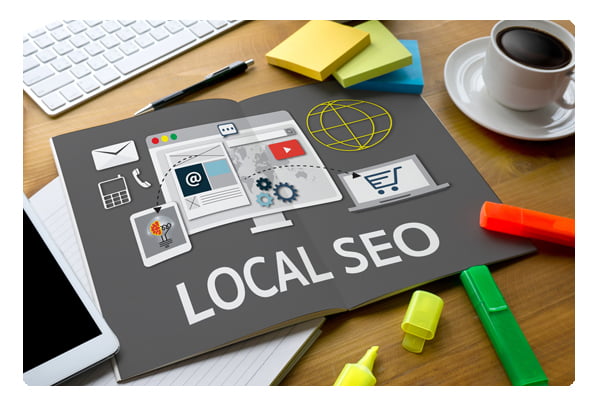In an increasingly digital world, small businesses need to adapt and optimize their online presence to stay competitive. One of the most effective ways to achieve this is through local SEO (Search Engine Optimization), a strategy designed to improve the visibility of your business in local search results. By focusing on local SEO, small businesses can reach customers in their immediate vicinity, boost foot traffic, and increase sales. In this article, we’ll explore how you can leverage local SEO to enhance your small business visibility and stand out from the competition.
What is Local SEO?
Local SEO refers to the process of optimizing your online presence to attract more business from relevant local searches. These searches typically include geographic qualifiers, such as city names or “near me,” and are often made by people seeking specific products or services within their area. Local SEO focuses on improving your business’s ranking on platforms like Google Maps, Google’s Local Pack, and localized search results, which are essential for small businesses that rely on local customers.
Why is Local SEO Important for Small Businesses?
For small businesses, local SEO is crucial because it helps you connect with customers who are actively looking for services or products in your geographic area. Unlike traditional SEO, which focuses on improving visibility across the entire internet, local SEO zeroes in on customers in close proximity to your business. With 46% of all Google searches having local intent, businesses that ignore local SEO are missing out on a significant opportunity to grow their customer base.
Benefits of Local SEO:
- Increased Online Visibility: Local SEO helps your business rank higher in search results, especially on Google Maps and local queries.
- More Targeted Traffic: By focusing on users near your location, you attract more relevant traffic, which leads to higher conversion rates.
- Higher Credibility: Businesses that rank in Google’s Local Pack (the top three local listings) are perceived as more trustworthy and credible by consumers.
Key Strategies to Leverage Local SEO
-
Optimize Your Google My Business Profile
Your Google My Business (GMB) profile is one of the most powerful tools in local SEO. It is what allows your business to appear in local search results, Google Maps, and the Local Pack. To optimize your GMB profile:
- Complete All Information: Ensure that your business name, address, phone number, website, and hours of operation are accurate and up to date.
- Add Photos and Videos: High-quality images of your storefront, products, or services help attract potential customers.
- Encourage Customer Reviews: Positive reviews boost your credibility and improve your ranking in local search results.
- Use Keywords: Include relevant local keywords in your business description to help search engines understand your business’s focus.
-
Optimize for Local Keywords
Keyword research is essential for local SEO success. Focus on keywords that are relevant to your business and location. For example, if you run a bakery in Chicago, use keywords like “best bakery in Chicago” or “fresh bread near me” in your content, meta descriptions, and titles.
Additionally, create location-based pages on your website to target specific neighborhoods or regions where your business operates. These pages should include localized content, such as testimonials from customers in that area or information about community involvement.
-
Focus on Local Backlinks
Backlinks, or links from other websites to yours, are an important factor in local SEO rankings. Focus on building relationships with other local businesses, organizations, or influencers to gain relevant backlinks. Sponsor local events, contribute guest blog posts to local publications, or join local business directories to earn valuable backlinks.
Local backlinks signal to search engines that your business is authoritative in your area, improving your chances of ranking higher in local search results.
-
Ensure Your NAP Information is Consistent
NAP stands for Name, Address, and Phone number. For local SEO to be effective, it’s essential that your NAP information is consistent across all online platforms, including your website, social media profiles, and local directories. Inconsistent information can confuse search engines and negatively impact your ranking.
Consider using citation tools such as Moz Local or BrightLocal to manage your business listings and ensure consistency across the web.
-
Create Locally Relevant Content
Content marketing plays a significant role in local SEO. By creating locally relevant content, you increase your chances of appearing in local search results. For instance, write blog posts about local events, community projects, or news that relates to your industry. You can also highlight partnerships with other local businesses or provide guides that offer value to local customers.
The more local relevance your content has, the more likely it is to resonate with search engines and potential customers.
The Role of Mobile Optimization in Local SEO
With the majority of local searches being conducted on mobile devices, optimizing your website for mobile is crucial. Ensure your site is mobile-friendly by having a responsive design, fast loading times, and easy-to-navigate pages. A well-optimized mobile site improves user experience and increases the likelihood that visitors will stay on your site, which can positively impact your local SEO rankings.
Conclusion
Leveraging local SEO is an essential strategy for small businesses looking to increase their visibility and attract local customers. By optimizing your Google My Business profile, using relevant local keywords, focusing on local backlinks, and creating localized content, you can significantly improve your rankings in local search results. As more consumers turn to search engines to find local businesses, investing in local SEO will help ensure that your business stands out in a competitive market.


